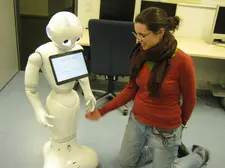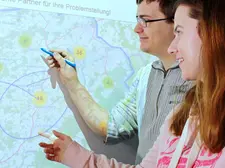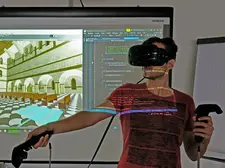Programme Profile
The degree programme was first offered at the University of Bamberg by the faculty of Information Systems and Applied Computer Science in 2004.
The degree programme was conceived to accommodate the growing importance of digital humanities as an application area of computer science. The characteristically high content and media-based demands attributed to IT applications in the areas of culture and media pose particular challenges for those working in these fields. For this reason, applied computer science comprising these areas is of particular value in the professional world. The bachelor’s degree programme in Applied Computer Science encourages students to understand the demands of various areas of application in order to be able to efficiently solve problems in these areas using modern information technologies. In their studies of computer science and applied computer science, students receive the skills required to do this.
Specialization areas can be chosen from the following fields:
- Computer Graphics,
- Explainable Machine Learning,
- Natural Language Processing,
- Information Visualisation,
- AI Systems Engineering,
- Cognitive Systems,
- Cultural Informatics,
- Media Informatics,
- Human-Computer Interaction,
- Multimodal Intelligent Interaction,
- Natural Language Generation and DIalogue Systems,
- User Experience and Design.
Current approaches and developments in these areas are further investigated in seminars, projects and theses.
The bachelor’s programme’s 30-ECTS segment in application electives lays the foundations for a humanities-based methodology and approach which can be expanded upon within the scope of master’s studies.
This arrangement enables students in the last stages of their studies to apply their acquired knowledge and skills to introductory or developmental projects in their respective fields of activity. Students are in the position to work with specialists to analyse problems pertaining to the humanities and social sciences. In conclusion – and this is what distinguishes them as experts in applied computer science – they are familiar with specific IT-relevant methods for dealing with this field of application’s unique demands, and are able to further develop and adapt them to particular tasks and challenges.
Continue to Structure and Curriculum.




